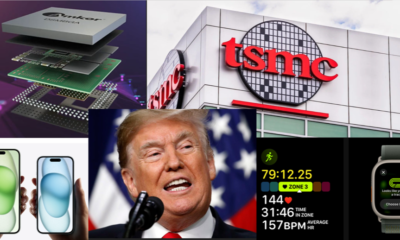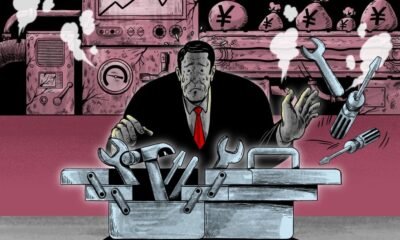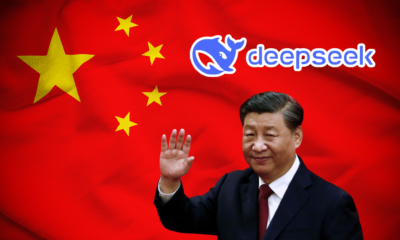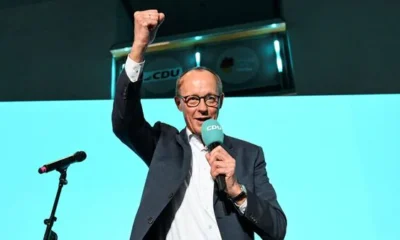Business
World’s Largest Sovereign Wealth Fund Sounds Alarm On Market Risks From Tariff-Induced Inflation; Absence Of Key World Leaders At WEF Indicates Growing Discontent?
Published
1 year agoon

Inflation driven by tariffs is emerging as one of the biggest market risks in 2025, according to Nicolai Tangen, the head of the world’s largest sovereign wealth fund.
Speaking at the World Economic Forum in Davos on Tuesday, Tangen expressed concern over the impact of inflation, particularly its link to tariffs. He pointed out that the U.S. is currently facing risks that could fuel further inflation, such as reduced labor supply and the potential for more tariffs. He warned that these factors may prevent inflation from coming down, despite hopes that it would.
Tangen also spoke about other major risks, including the prospect of higher interest rates remaining in place for a longer period, the growing burden of government debt, and ongoing geopolitical tensions. He singled out the concentration of U.S. equities, particularly in large-cap tech firms, as a significant concern, noting that this concentration has never been higher.
Meanwhile, at the World Economic Forum, European CEOs offered mixed reactions to Donald Trump’s return to office. Some saw his leadership as a boost to business, particularly due to his stance on reducing regulation and increasing energy supply.
Richard Edelman, CEO of the communications firm Edelman, stated that Trump’s approach could help revive America’s “animal spirit” and create a more business-friendly environment. However, Edelman also acknowledged the challenge businesses would face in balancing other important issues, such as diversity, equity, and inclusion (DEI) and sustainability, as they manage the political ecosystem under Trump’s leadership.
Steven van Rijswijk, CEO of ING, suggested that Trump’s leadership should serve as a wake-up call for Europe. He emphasized that Europe must focus more on its economy and growth, urging the region to become more competitive. He stressed the importance of boosting labor productivity, investing in AI, and enhancing the Capital Markets Union to improve capital flow within Europe. According to van Rijswijk, many of Trump’s ideas, especially those related to economic competitiveness, also apply to Europe, and strengthening this aspect would benefit the entire society.
Sander van’t Noordende, CEO of Randstad, had a different take when asked about Trump’s push for a merit-based system and his efforts to roll back diversity, equity, and inclusion (DEI) initiatives. Van’t Noordende firmly disagreed with Trump’s approach, pointing out that many businesses are sticking to their DEI programs because they’re not only the right thing to do but also good for business. He noted that in the U.S., employers enjoy a high level of trust from their employees, with 85% of workers trusting their employer. Businesses don’t want to jeopardize that trust by pulling back on important DEI efforts.
Mario Greco, CEO of Zurich Insurance, offered a more critical view of global climate efforts, particularly regarding the Paris Agreement. He admitted that the agreement has failed to deliver on its ambitious targets and suggested that alternative solutions, particularly technological innovations, are needed to address the urgent climate crisis. Greco didn’t seem optimistic that the Paris Agreement would be the game-changer needed to combat rising temperatures.
Vas Narasimhan, CEO of Novartis, shared his thoughts on Trump’s health secretary pick, Robert F. Kennedy Jr., particularly in light of his anti-scientific statements. Narasimhan expressed concern but also noted that his company had managed to maintain a constructive dialogue with the administration on policy changes that are important for the pharmaceutical industry. Despite areas of disagreement, Narasimhan was cautiously optimistic about the potential for a better environment for the industry compared to the previous administration.
Lastly, Kirill Dmitriev, head of the Russian Direct Investment Fund, offered a more positive view of Trump’s leadership. He praised Trump’s bold actions and their potential to unlock economic growth, transform global challenges, and dialogue and problem-solving on the world stage.

Where Is Everyone?
As the World Economic Forum (WEF) kicks off in Davos, Switzerland, the focus is typically on the gathering of global leaders, politicians, and business moguls for this annual event. However, what may speak volumes this year is the list of prominent leaders who are notably absent from the forum.
While U.S. President Donald Trump, who is set to be inaugurated on Monday, will address the gathering via live video link on Thursday, several key figures are skipping the event entirely. Among those missing are Indian Prime Minister Narendra Modi, Chinese President Xi Jinping, French President Emmanuel Macron, Italian Prime Minister Giorgia Meloni, and British Prime Minister Keir Starmer.
Of the G7 nations, which include the U.S., Canada, Japan, and the largest European economies, the only head of state attending in person is outgoing German Chancellor Olaf Scholz.
This year marks the 55th edition of the WEF, which runs from Monday to Thursday, with nearly 3,000 leaders from over 130 countries expected to attend.
The forum’s organizers emphasize the critical need for dialogue in an increasingly uncertain world. Around 350 government leaders, including 60 heads of state and government, will convene in Davos to address global challenges and seize emerging opportunities. The theme of the event is “Collaboration for the Intelligent Age,” with key discussions focusing on areas like reimagining growth, advancing industries in the intelligent age, investing in people, safeguarding the planet, and rebuilding trust.
Missing…
However, not all of the world’s major players will be in attendance to engage in these conversations.
Jan Aart Scholte, a professor of global transformations and governance at Leiden University, pointed out that leaders from Brazil, China, and India, who were keynote speakers just a decade ago, are absent this time around. Russia, which hasn’t been welcomed at the forum in recent years, is also notably missing. Scholte observed that the general trend this year is that many of the heads of state from the G20 will not be present, leaving a gap in representation from some of the world’s most influential countries.
The absence of certain world leaders from the World Economic Forum (WEF) is often not explicitly explained, but it’s clear that pressing domestic challenges—ranging from slowing economic growth to political turmoil—are factors that keep heads of state away. In recent years, there’s also been a growing ambivalence towards attending an event that’s been criticized as elitist and disconnected from the real issues facing ordinary people.
The WEF, however, maintains that its role is to provide a platform for a wide array of stakeholders—from business and government to academia, civil society, media, and the arts—to meet and collaborate in a neutral, not-for-profit space. According to the forum, these diverse participants come together to find common ground and work towards positive change on global issues.
WEF, Not Relevant Anymore?
In a statement WEF acknowledged the absence of some key global leaders but emphasized that the impact of the Annual Meeting is shaped by the collective efforts of a broad and representative community.
The forum’s agenda this year is focused on addressing urgent global challenges, including economic fragmentation, technological transformation, and climate action. WEF also pointed out that global leaders have numerous commitments and responsibilities, and their absence doesn’t reduce the forum’s ongoing engagement with their governments and institutions year-round.
Despite some notable absences, several big names will still be present at this year’s summit.

Key figures like Ding Xuexiang, China’s vice premier; Ukraine’s President Volodymyr Zelenskyy; Argentina’s Prime Minister Javier Milei; and South Africa’s President Cyril Ramaphosa are all set to speak in Davos. Ursula von der Leyen, head of the European Commission, will also attend, along with leaders from global organizations like the International Monetary Fund, United Nations, World Health Organization, and World Trade Organization.
Sven Smit, a senior partner at WEF’s strategic partner McKinsey & Company, noted that understanding what is on the minds of the leaders attending is a priority for participants. While it’s hard to predict the main themes, discussions will likely touch on topics like growth and sustainability. The unpredictable nature of Davos, he explained, is what makes it so interesting.
Under Fire
However, the WEF has found itself on the wrong side of the anti-globalization movement in recent years, particularly from populist leaders like Trump and nations such as Russia and China. Scholte, a professor of global transformations, observed that the WEF’s role in the global economic discourse has shifted since the global financial crisis. He pointed out that while proponents of a liberal, open world economy used to speak with disdain about contrary views, there’s now more recognition that the world has changed, and sometimes the liberal economic model doesn’t work for everyone.
Despite these challenges, the WEF remains a key event for many business and political leaders. While it may not hold the same magnetic pull it did a few decades ago, Scholte emphasized that it still has significant influence in certain areas of global economic governance, and to dismiss its relevance would be a mistake.
You may like
-


Taiwan’s ‘Historic’ TSMC Deal, A Win Or The End Of Its ‘Silicon Shield’ As China Threatens? A Jittery Taiwan Watches Trump’s Moves On Ukraine, Wondering, Could We Be Next?
-


America And China’s Thirst For Gold In 2025 Is Draining Other Countries’ Reserves; Here’s Why?
-


China To Cut Inflation Outlook To 20-Year Low, Eyes Fresh Stimulus At ‘Two Sessions’ To Boost Economy
-


DeepSeek Ai Rush. China’s AI Contender Gears Up for Next Big Launch Even As It Gets Xi Jinping’s Blessings
-


Trump’s Latest Tariff Move on Mexico and Canada. Import Taxes Back on Track Hinting At A Full Blown Trade War!
-


Germany’s Friedrich Merz’s Big Balancing Act—Trump, Borders & Europe’s Future. Can He Deliver?
